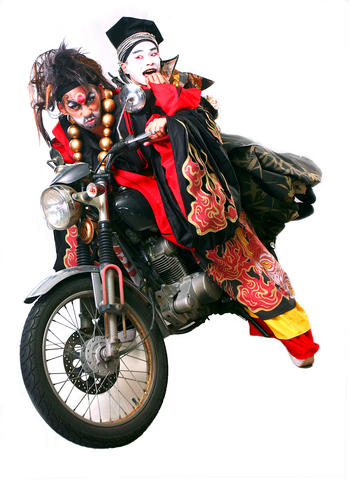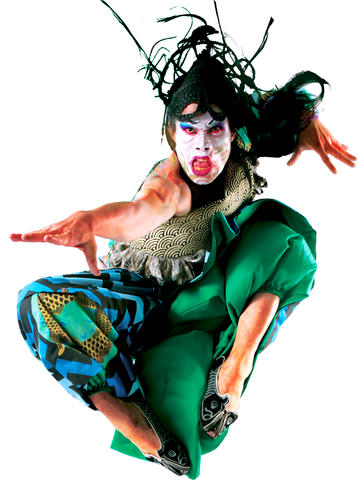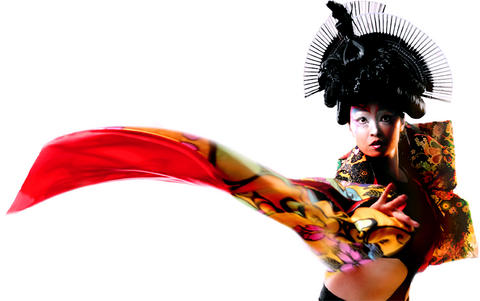Contemporary Legend Theater (當代傳奇劇場, CLT), under the direction of Beijing opera innovator Wu Hsing-kuo (吳興國), has, since its inception, taken a bold path in its efforts to give the centuries-old Chinese artistic tradition relevance to the modern world. 108 Heroes (水滸108) is its most ambitious project to date, potentially part of a three-part series which aims to radically reinterpret the Chinese classic novel Water Margin (水滸傳), also widely known as Outlaws of the Marsh and All Men Are Brothers in various English editions.
To achieve this goal, CLT has drawn on a powerhouse of talent, most notably contemporary novelist and literary figure Chang Ta-chun (張大春), who wrote the script, and pop idol and composer Emil Chow (周華健), who contributed contemporary music and songs, in addition to Wu himself. That these three names should appear together is remarkable in itself, for the worlds of high-brow contemporary literature, pop music and Beijing opera would seem unlikely bedfellows. Whether the CLT team has managed to bring these worlds together into a single unified production remains to be seen, for the work was still undergoing fine tuning this week prior to its world premiere at Taipei's Metropolitan Hall tonight.
The novel, of uncertain authorship and with many versions, came into wide circulation in the 14th century and tells the story of a band of outlaws who were active in the early 12th century during the Song Dynasty. It is very much a boy's book about honor among sworn brothers and the nature of justice in a corrupt world. It contains an interminable series of violent encounters between various characters, often for the most trivial reasons (slighted honor or excessive drinking), and in many respects is the ancient equivalent of the First-Person Shooter of today. It is also notorious for its appalling treatment of its female characters, when it can be bothered with the doings of women at all.

PHOTO: COURTESY OF CONTEMPORARY LEGEND THEATER
Sections of this massive novel have been adapted through the ages for opera, but 108 Heroes makes a radical revision of even some basic elements of the story to make it more relevant and interesting for a contemporary audience. Most notably, the roles of female characters have been expanded, in some cases drawing on other related source materials.
Moreover, Wu has brought in five aspiring opera performers to play a multiplicity of roles that the show demands. This is something of a Wu specialty, showcased most notably in his adaptation of King Lear, in which he played all the roles himself. These performers, though only in their early 20s have over a decade of experience behind them already (opera training starts young), are pushed to the limit. "This is for their benefit," Wu said. "The thing performers lack most these days is stage experience." Wu's direction has allowed them the space to present their own perspectives and personalities, giving this opera a youthful edginess that is new to CLT, which has usually had Wu as the focus of major shows.
Wu, who has made a career of reinterpreting classic Western works such as Macbeth and The Tempest for modern audiences using the forms of traditional Chinese opera, says that staying relevant and retaining audiences has always been at the heart of his endeavor. "I was forced into doing Western works, for only in this way could I find audiences for Chinese opera," he said of his early days as a young opera performer. These ideas where at the heart of his break from the opera establishment and the founding of CLT in 1986. "When we adapt a work, we must look at how it connects with the modern world. This is our central concern."

The idea of crossing boundaries, of mixing media, of fusing Eastern and Western forms, of bringing traditional arts in the 21st century, have all become cliches of the modern performing arts. Critics are inclined to say that what emerges is simply a hodgepodge, that by trying to be everything, it ends up being nothing. Wu, in mixing up various styles of opera, and even bringing in pop and hip-hop musical elements in his new show, believes that he manages to remain true to the essence of Chinese opera.
Commenting specifically on the mix of various opera styles, Chang said: "Let's look at American music, the period when jazz was developing. I think that what Wu is doing with Chinese opera is similar to the situation of when jazz was emerging. All sorts of music, such as gospel, soul, blues were mixed up together. This is the same sort of thing."


Exceptions to the rule are sometimes revealing. For a brief few years, there was an emerging ideological split between the Democratic Progressive Party (DPP) and Chinese Nationalist Party (KMT) that appeared to be pushing the DPP in a direction that would be considered more liberal, and the KMT more conservative. In the previous column, “The KMT-DPP’s bureaucrat-led developmental state” (Dec. 11, page 12), we examined how Taiwan’s democratic system developed, and how both the two main parties largely accepted a similar consensus on how Taiwan should be run domestically and did not split along the left-right lines more familiar in

As I finally slid into the warm embrace of the hot, clifftop pool, it was a serene moment of reflection. The sound of the river reflected off the cave walls, the white of our camping lights reflected off the dark, shimmering surface of the water, and I reflected on how fortunate I was to be here. After all, the beautiful walk through narrow canyons that had brought us here had been inaccessible for five years — and will be again soon. The day had started at the Huisun Forest Area (惠蓀林場), at the end of Nantou County Route 80, north and east

Specialty sandwiches loaded with the contents of an entire charcuterie board, overflowing with sauces, creams and all manner of creative add-ons, is perhaps one of the biggest global food trends of this year. From London to New York, lines form down the block for mortadella, burrata, pistachio and more stuffed between slices of fresh sourdough, rye or focaccia. To try the trend in Taipei, Munchies Mafia is for sure the spot — could this be the best sandwich in town? Carlos from Spain and Sergio from Mexico opened this spot just seven months ago. The two met working in the

This month the government ordered a one-year block of Xiaohongshu (小紅書) or Rednote, a Chinese social media platform with more than 3 million users in Taiwan. The government pointed to widespread fraud activity on the platform, along with cybersecurity failures. Officials said that they had reached out to the company and asked it to change. However, they received no response. The pro-China parties, the Chinese Nationalist Party (KMT) and Taiwan People’s Party (TPP), immediately swung into action, denouncing the ban as an attack on free speech. This “free speech” claim was then echoed by the People’s Republic of China (PRC),